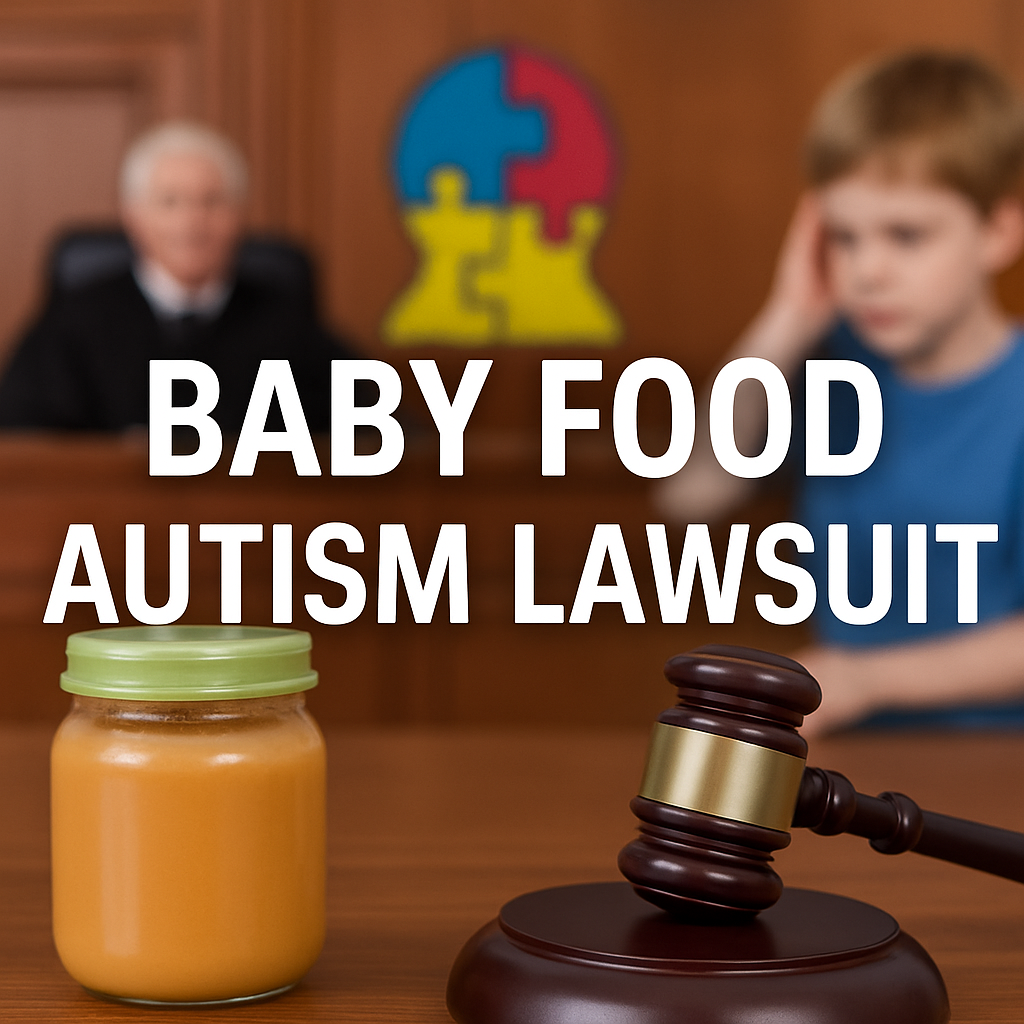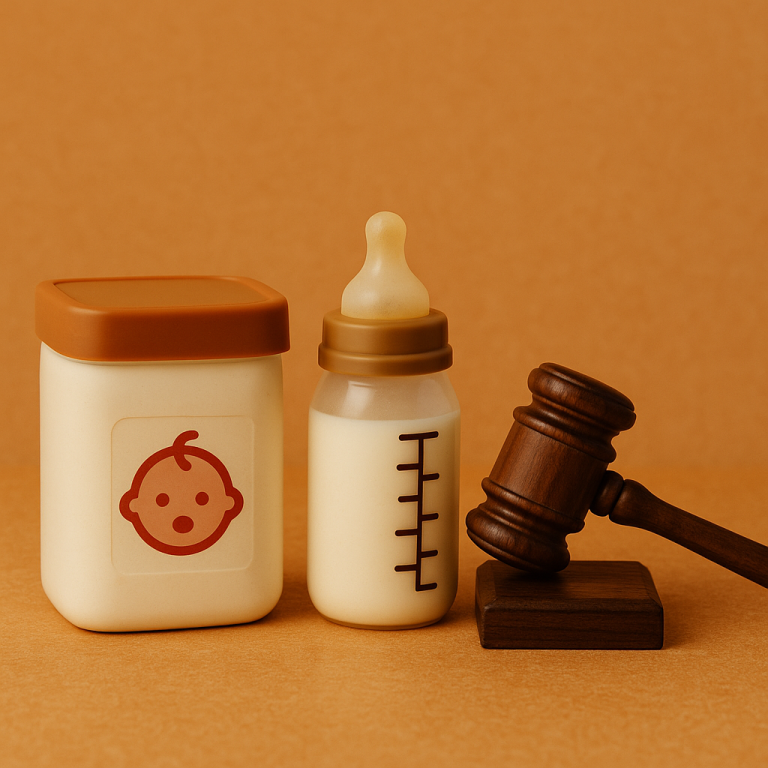The “Baby Food Autism Lawsuit” has sparked outrage across the nation from parents, pediatricians, and consumer organizations. Several lawsuits have been filed, alleging a wave of contamination with toxic heavy metals, with well-known baby food manufacturers knowingly selling their products to consumers with unacceptable levels of these toxic heavy metals. Most notably, the “Baby Food Autism Lawsuit” claims that heavily toxic metals products that include arsenic, lead, cadmium, and mercury are unsafe, and that the poisonous heavy metals can cause developmental delays in babies and children and cause autism spectrum disorder (ASD) or attention-deficit/hyperactivity disorder (ADHD). Understandably, parents are very anxious about their kids and insist on accountability, transparency, and safe food.
In recent weeks, studies and investigative reports have warned parents about baby food manufacturers like Gerber, Beech-Nut, Earth’s Best, and HappyBABY for potentially not regulating the levels of toxic metals in their baby food products. Families across the United States have filed lawsuits seeking justice for the damages they claim the products have caused or are causing to their children. In today’s article, we outline the latest developments, legal theories, scientific studies, and provide guidance on what parents should do next.
The key phrase “Baby Food Autism Lawsuit” will guide the discussion throughout this article. We will break down the facts, expose the companies involved, and summarize on the legal avenue that families impacted can pursue.
What Is the Baby Food Autism Lawsuit About?
Understanding the core of the Baby Food Autism Lawsuit helps reveal why families are demanding justice.
Allegations Against Baby Food Companies
The Baby Food Autism Lawsuit accuses several baby food manufacturers of selling products contaminated with heavy metals. Plaintiffs allege these companies knew about the contamination yet failed to take corrective actions or issue warnings.
Brands named in lawsuits include:
- Gerber
- Beech-Nut
- Earth’s Best (Hain Celestial)
- HappyBABY (Nurture Inc.)
- Parent’s Choice (Walmart)
- Sprout Foods
A 2021 Congressional Subcommittee report prompted mass litigation. The report uncovered internal reports and test results demonstrating toxic metals in baby foods at hazardous levels. Knowing this, companies proceeded to make sales, which possibly broke consumer trust and protection laws.
How Are Toxic Metals Linked to Autism?
To comprehend the basis of the lawsuit, one must look into the scientific allegations that link toxic metals and autism.
Scientific Research on Heavy Metals and Neurodevelopment
Heavy metals such as arsenic and lead are neurotoxic. Repeated exposure harms brain development, particularly in infancy. The Baby Food Autism Lawsuit alleges this exposure caused illnesses like autism and ADHD. Many peer-reviewed articles substantiate these allegations:
- Lead exposure has been associated with reduced IQ, attention deficits, and delays in cognition.
- Arsenic, particularly inorganic species present in rice products, impacts memory and behavior.
- Cadmium and mercury have been linked to impaired neural signaling.
A 2020 study published in Environmental Health Perspectives discovered that prenatal and early-life toxic metal exposure raises autism characteristics in children.
Which Brands Are Named in the Baby Food Autism Lawsuit?
Identifying the companies under legal scrutiny helps parents assess their child’s past consumption risks.
Overview of Companies Facing Litigation
- Gerber Products Company: Accused of selling cereals with high lead content.
- Beech-Nut Nutrition Company: Found to use ingredients with high levels of arsenic.
- Nurture Inc. (HappyBABY): Reportedly ignored internal reports showing heavy metal contamination.
- Hain Celestial Group (Earth’s Best): Did not test finished products, only raw materials.
- Walmart (Parent’s Choice): Allegedly failed to conduct adequate safety tests.
Parents whose children were diagnosed with ASD or ADHD after regularly consuming these products have filed lawsuits against each of these companies.
What Did the Congressional Report Reveal?
The Baby Food Autism Lawsuit gained traction following key revelations from government investigations.
Government Action and Consumer Backlash
In February 2021, the U.S. The House Subcommittee on Economic and Consumer Policy published an explosive report titled “Baby Foods Are Tainted with Dangerous Levels of Arsenic, Lead, Cadmium, and Mercury.”
Key findings:
- Baby foods contained 100+ parts per billion (ppb) of arsenic in some samples.
- Internal documents showed companies were aware of contamination but continued distribution.
- Some brands did not test finished products—only raw ingredients.
- The FDA was criticized for lack of oversight and regulatory action.
Lawyers have cited this report in nearly every Baby Food Autism Lawsuit filed since its release.
How Are Families Fighting Back?
Understanding how lawsuits are framed offers insight into parents’ legal strategies.
Legal Grounds in the Baby Food Autism Lawsuit
The legal claims filed involve:
- Negligence
- Failure to warn
- False advertising
- Violation of consumer protection laws
Many cases are consolidated as part of mass torts. Plaintiffs seek compensation for:
- Medical bills
- Ongoing therapy and special education costs
- Emotional distress
- Loss of quality of life
Law firms such as Wisner Baum, Sokolove Law, and Beasley Allen are leading the litigation.
What Scientific Research Supports These Claims?
Evidence from credible medical and toxicology research forms the backbone of many Baby Food Autism Lawsuit arguments.
Medical and Toxicology Studies Cited
Studies cited in court include:
- “Autism Spectrum Disorder and Prenatal Lead Exposure” — links higher lead exposure to ASD traits.
- Journal of Pediatrics — found cognitive delays in children with arsenic levels above 10 ppb.
- Environmental Toxicology and Pharmacology — documents behavioral changes from cadmium exposure.
Experts argue that chronic low-level exposure during a sensitive developmental period is especially dangerous. These findings support plaintiffs’ arguments in the Baby Food Autism Lawsuit.
What Should Parents Do If Affected?
Taking action starts with awareness and understanding your options.
Legal and Health Steps to Take
If your child consumed baby food from a named brand and has been diagnosed with ASD or ADHD:
- Consult your pediatrician for a developmental assessment.
- Review the brands and batches you used.
- Contact a law firm handling the Baby Food Autism Lawsuit.
- Gather medical and purchase records.
You may be eligible for compensation or inclusion in a class action.
Are There Class Action Lawsuits or Individual Claims?
Lawsuit structure matters. Parents should understand the differences before deciding how to proceed.
Current Status of Litigation
- Some cases are being filed as class action lawsuits, representing large groups of parents.
- Others are individual claims with unique medical histories.
- Judges are considering multi-district litigation (MDL) to consolidate cases.
Courts across the U.S. are holding pre-trial hearings, but they have not reached a nationwide settlement as of June 2025. District Courts.
Has the FDA Responded to the Lawsuit and Reports?
The federal response has drawn mixed reactions from parents and safety advocates.
Regulatory Response and Public Pressure
The FDA launched its “Closer to Zero” initiative to reduce heavy metal exposure in baby food. However, critics argue this program is too slow and lacks enforcement.
In response to public pressure:
- Some companies began revising sourcing policies.
- Others removed rice-based ingredients.
- Label transparency has improved, but inconsistently.
Still, plaintiffs argue these actions came too late and do not address past harm.
What Changes Are Being Demanded?
Legal action is only part of the push. Policy reform is the long-term goal.
Policy, Safety, and Industry Accountability
Consumer advocates are calling for:
- Mandatory testing of finished baby food products
- Legal limits for arsenic, lead, cadmium, and mercury
- Clear labeling for ingredient sources
- Recall systems and batch traceability
Legal and legislative pressure from the Baby Food Autism Lawsuit is pushing the government toward stricter food safety reforms.
Brands and Alleged Toxic Metals
| Brand | Alleged Metals Found | Legal Action Type |
|---|---|---|
| Gerber | Lead, Arsenic | Individual + Class Action |
| Beech-Nut | Arsenic, Cadmium | Class Action |
| Earth’s Best | Lead, Mercury | Individual Cases |
| HappyBABY | Cadmium, Lead | Mass Tort |
| Parent’s Choice | Arsenic, Lead | Class Action |
FAQs About the Baby Food Autism Lawsuit
How do I know if my baby food is affected?
Check the batch number, manufacturing date, and brand. Consult public recall notices and lawsuit documents.
Is there a deadline to file a claim?
Yes. Each state has a statute of limitations. Contact a lawyer promptly.
Will these companies face criminal charges?
Currently, all actions are civil lawsuits. Authorities have not filed any criminal charges as of June 2025.
Can adults affected by these products in childhood sue?
Possibly. Consult legal counsel if you have documentation of long-term use and diagnosis.
Conclusion
The Baby Food Autism Lawsuit is growing with more families coming forward for justice for the developmental harm done to their children. The lawsuits are alleging that major baby food companies sold them toxic products that caused autism spectrum disorder or ADHD. With more people becoming aware of the realities of the issue of baby food and the ongoing legal battle, there is the hope for change in the baby food industry.
Take immediate action if you believe toxic baby food has exposed your child. Contact your doctor, maintain documentation, and find a law firm specializing in the Baby Food Autism Lawsuit. You might receive compensation in addition to helping to push for changes in the industry.




